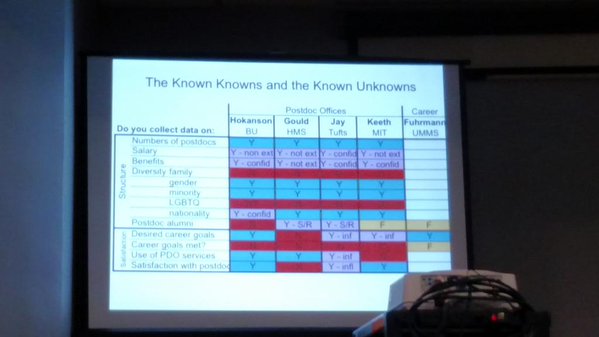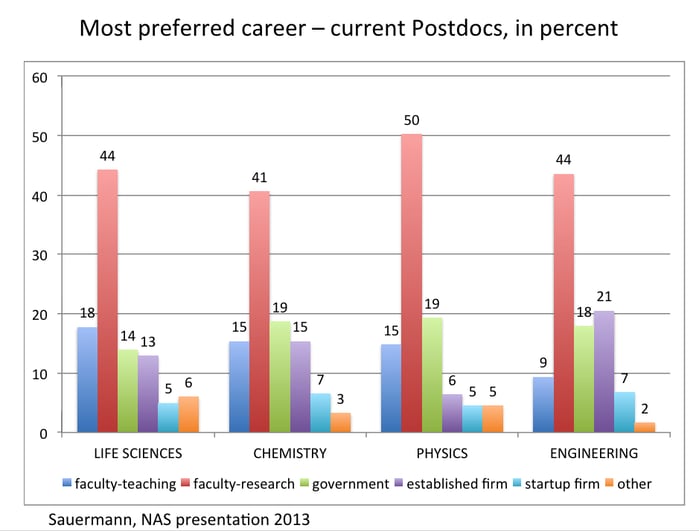Addgene recently attended and sponsored the Future of Research (FOR) Boston Symposium 2015. I personally participated as a member of the Career Paths Panel on the second day of the symposium and live tweeted throughout the event (look for a ton of tweets from the Symposium under #FORBOS15) - my first time live tweeting: a fun and surprisingly exhausting experience. As Addgene believes many of the topics discussed during the symposium will prove incredibly important to the stability of the biological research enterprise going forward, in this post I’ll point out some of the highlights and takeaways I got from the symposium.
The goal of the Future of Research Symposium
On the FOR website, the FOR Boston 2015 organizers indicate that the main question they wanted to focus on during the symposium was “How many graduate students/post-docs?” You can find some of the more detailed questions the organizers wanted to touch on in organizer David Riglar’s blog post. Essentially the goal was to determine what data is required for the academic research community to develop a plan to make postdoctoral pay/benefits commensurate with work training and experience, better align trainee expectations with job outcomes, and increase diversity in the academic research environment. The “how many?” question lies at the base of all these questions as there is not particularly good data on how many post-docs there are in the U.S., their makeup (in terms of nationality, gender, race, etc), or their career outcomes. Some of the more specific contours of what we need to know in order to even assess the current state of research became more clear throughout the various sessions of the symposium.
Structural problems in academic research and potential solutions
During the first couple of sessions of the symposium it was clear that, even though postdoc associations across different universities are trying to compile more comprehensive demographic information about the postdoc work force, problems start with the question of “What is a Post-doc?” The National Academies define a postdoc as “An individual who has received a doctoral degree (or equivalent) and is engaged in a temporary and defined period of mentored advanced training to enhance the professional skills and research independence needed to pursue his or her chosen career path,” but individual institutions can have many different names for the positions commonly thought of as postdocs. Unfortunately, even when universities have simple postdoc numbers sorted out there can be gaps in knowledge of demographics and the information is often confidential (see image below).
Slide of information gathered by Postdoctoral Associations around Boston - From Panel Session 2: Defining the Postdoc: An Institutional Perspective.
This lack of complete information does not, however, prevent us from identifying problems with the structure of the academic research workforce, and we are beginning to identify potential solutions. Keynote speaker Paula Stephan did a fantastic job of articulating many of these problems and some solutions. The structural problems seem to boil down to that fact that training in the academic research environment is setup to prepare trainees for further work in academia. In fact it is this very idea that postdocs are acquiring training to become professors that is provided as an explanation for why they are paid relatively low wages (Stephan estimates that postdocs are paid $16.15/h before fringe benefits, less even than the $21/h [on the low end] that grad students are paid before fringe benefits); what they don’t make in wages, they make up for in training. Unfortunately, these low wages also make it so it is more cost-effective for PI’s to pay postdocs as opposed to staff scientists. This results in a glut of postdoctoral trainees who, even though they are aware that only 14.3% of PhDs in the life sciences end up in tenure track position 5 years after receiving their PhDs, still strive to become academic researchers themselves(44% of postdocs in the life sciences name faculty-research as their preferred career outcome - see below). Stephan additionally pointed out that, even though many of these postdocs will have to move on to non-academic careers, much of the training they receive as postdocs is not transferrable to other environments.

Slide from Paula Stephan’s Talk (All slides can be found here).
Importantly, the panel offered some great solutions to these problems and some that stuck out to me were:
Decrease the Number of Postdocs
- De-incentivize going into PhD programs as the standard option for scientists by requiring graduate students to pay for part of their tuition. Having trainees pay may also make them more attuned to the bang for their buck - make them demand more services based on what they're spending.
- Increase the number of science masters programs to prepare scientists for positions outside of academia
- Require that postdoc salaries be paid on fellowships instead of grants such that PIs no longer save grant money by paying relatively low postdoc salaries as opposed to Staff Scientists
Increase the Starting Salary for Postdocs to $50,000 (the current median postdoc starting salary as reported by Paula Stephan is $40,000)
Increase Knowledge about Postdoc and Graduate Student Career Outcomes
- University websites do not currently publish career outcomes for PhDs or postdocs. Having this information publicly available may realign trainee expectations with actual job outcomes and/or disincentivize joining long programs if it is obvious that a desired career outcome is not easily achieved.
Of note, it was highlighted during the conference that just increasing funding for academic research will not solve these problems. The incentives that encourage PIs and universities to hire a glut of trainees at low wages will still be there without restructuring.
Positive Points for Trainees - Taking Steps to Achieve a Successful Career
Career Advice from the Career Path Panel
Two of the panels at the FOR Boston 2015 symposium, the Career Path Panel and the Early Career Researchers in Publishing panel, focused on showing researchers that they can take steps to achieve success in their careers. The take-away message I took from the career panel was that there are many companies and organizations (including Addgene), that need people who are data oriented, scientifically minded, and able to communicate complex information - all traits you are likely to find in graduate students and postdocs. Trainees however, need to be made more aware of the fact that these positions are available and that many of the people who work in them are incredibly happy with their jobs. One of the Saturday Hack Day projects sought to make an interactive game that highlights just this point. As part of this, trainees need to be able to network and interact more with people who have taken a variety of career paths and should be able to take steps to broaden their skills beyond those required at the lab bench.
At Addgene we try to do our part in boosting awareness of various career opportunities through our career, networking, and management for scientists blog series. We hope to expand these resources in the coming months and welcome guest bloggers who can provide additional advice to trainees navigating the waters of career development.
Publishing Panel
The Early Career Researchers in Publishing Panel brought in editors from a variety of publications as well as young PIs and all gave advice on how to succeed in publishing in the current academic environment. Some great tips from this panel included:
- Write Often
Whether you take on opportunities to do some blogging, write reviews, or write for a university publication, improving your general writing skills will help you in your academic publishing goals and make you a better communicator overall.
- Don’t Write in a Vacuum
Your research papers should go through many iterations read by your PI, your collaborators, others you know in the field, and even people who aren’t in the field. One PI on the panel even suggested projecting your manuscript onto a wall and reading it out loud. While it is certainly true that not all PIs can take the time to do this, you should always reach out to your peers and other mentors who can help you.
- You Can Talk to Your Editors
I wish I had been more cognizant of this during my PhD. Submitting a publication doesn’t have to be like throwing it into a black box. You can talk your editor if you have any questions or concerns throughout the publishing process.
The diversity panel - Equity and inclusion
The final and possibly the most important panel of the symposium was on diversity in academic research. As during previous panels, speakers Moon Duchin, Rafael Luna, Joan Reede, Alberto Roca, and Jessica Tytell made it was obvious that more data is needed for us to fully understand the precise makeup of academic researchers and, in fact, one of the projects developed during the Saturday Hack Day Session focused on finding this information and making it more easily digestible/available.
What I viewed as the most important take-away from this session was the idea that simply satisfying a percent requirement for diversity in graduate students, postdocs, or professors isn’t nearly enough to reach diversity goals. Universities need to show that people from all backgrounds are truly included as members of their research communities and are treated equitably. One of the questions that needs to be asked going forward is: How do we measure inclusion and equity? This is a difficult question but not one that should be abandoned simply because it is difficult and is key to the continued growth and stability of academic research.
Panelist Moon Duchin provided a concrete example of how underrepresented individuals are discluded/not treated equitably even when hired; well-meaning mentors often fail to judge the work of underrepresented groups under their mentorship with the same critical eye they place on others within their labs - as a sort of over-compensation, these mentors can treat the underrepresented individuals too nicely. When the work of the underrepresented individual is then judged objectively and possibly negatively by a third party, it can come as a shock to the underrepresented individual. In an attempt to be nice, the mentor fails to effectively mentor the underrepresented - the mentor over praised and failed to warn of the impending problems. This can lead to a lack of trust in the mentor and this training is clearly not equitable to that of other trainees despite the fact that the underrepresented individual is welcomed into the lab. We need some way of capturing, quantifying, and preventing this type of failure.
Final thoughts
The FOR Symposium Boston 2015 shined a light on some of the many problems facing the academic research enterprise. In addition to highlighting some of the important questions that still need to be answered about the makeup and welfare of the many researchers out there who are making great progress on some of the world’s most profound questions, panelists and participants of the symposium began providing means to answer some of these questions and provided ways to solve some of the structural problems within the research environment itself. At Addgene we hope that all parties involved in making academic research a successful and enjoyable path for people from all walks of life will continue having conversations like those at the FOR symposium and will enact their solutions as soon as they become actionable.
Additional Resources
- The Postdoctoral Experience Revisited. PubMed PMID: 25590106.
- Paula Stephan’s Book - How Economics Shapes Science
- The Future of Research Website
- Additional Publications of Interest Can Be Found Here
Resources at Addgene
- Read David Riglar's FOR Boston 2015 Blog Post
- Read Our Career Blog Posts
- Read Our Networking Blog Posts
Topics: Science Careers, Early Career Researcher






Leave a Comment